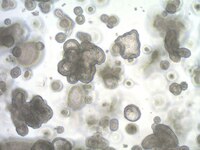SCC300 Sigma-Aldrich3dGRO™ Human iPSC Derived Colon Organoids
Highly characterized cryopreserved human colon intestinal organoids derived from integration-free human induced pluripotent stem cells (iPSCs).
More>> Highly characterized cryopreserved human colon intestinal organoids derived from integration-free human induced pluripotent stem cells (iPSCs). Less<<Recommended Products
Overview
| Replacement Information |
|---|
| References |
|---|
| Product Information |
|---|
| Biological Information | |
|---|---|
| Cell Line Type |
|
| Physicochemical Information |
|---|
| Dimensions |
|---|
| Materials Information |
|---|
| Toxicological Information |
|---|
| Safety Information according to GHS |
|---|
| Safety Information |
|---|
| Storage and Shipping Information | |
|---|---|
| Storage Conditions | 3dGRO™ Human iPSC Derived Colon Organoids should be stored in liquid nitrogen. |
| Packaging Information | |
|---|---|
| Material Size | ≥ 1500 organoids/vial |
| Transport Information |
|---|
| Supplemental Information |
|---|
| Specifications |
|---|
| Global Trade Item Number | |
|---|---|
| Catalogue Number | GTIN |
| SCC300 | 04054839989728 |
Documentation
3dGRO™ Human iPSC Derived Colon Organoids SDS
| Title |
|---|
Data Sheet
| Title |
|---|
| 3dGRO¿ Human iPSC Derived Colon Organoids |
| Data Sheet-SCC300 |
| Data Sheet-SCC300 |












